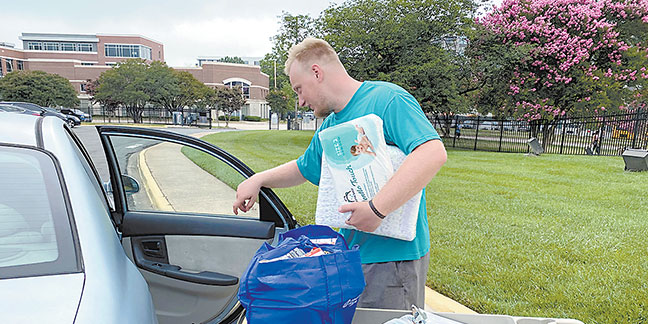Shelves emptying fast; donations urgently needed
 Nolan Butler, Impact coordinator for VISTA, assists with distributing food at Catholic Charities’ Charlotte food pantry on Tuesday. (Photo provided by Liz Chandler)CHARLOTTE — The long line of cars winding through the Diocesan Pastoral Center parking lot on Tuesdays and Thursdays to pick up free food from Catholic Charities volunteers is a telling sign of the food insecurity people across western North Carolina are suffering.
Nolan Butler, Impact coordinator for VISTA, assists with distributing food at Catholic Charities’ Charlotte food pantry on Tuesday. (Photo provided by Liz Chandler)CHARLOTTE — The long line of cars winding through the Diocesan Pastoral Center parking lot on Tuesdays and Thursdays to pick up free food from Catholic Charities volunteers is a telling sign of the food insecurity people across western North Carolina are suffering.
The food pantry shelves are emptying as fast as they are stocked, and agency leaders are urgently calling for help.
All three of Catholic Charities’ food pantries – Asheville, Charlotte and Winston-Salem – are experiencing critical shortages of food to give out to local families in need.
“It’s post-COVID effects, inflation, the rising cost of gas and food, wages not keeping up with cost of living and the cost of housing getting more expensive – all of those things coming together” that are driving up the need, says Jesse Boeckermann, Catholic Charities’ Western Region Director.
The current rate of inflation in the U.S. is 8.6%, up from 7% last year at this time, according to federal government data. According to AAA, people across the diocese are paying anywhere from $4.26 to $4.66 at the pumps for a gallon of regular gas – double the average price when the pandemic first hit in 2020.
Food costs are also dramatically up across western North Carolina. In Asheville food costs are now 9.3% above the national average, Charlotte’s are 11.1% higher, and Winston-Salem’s are 4.4% higher.
Boeckermann says his staff has seen an increase in requests for food aid since February. He estimates that where $200 might have enabled clients to purchase 10 days’ worth of food, now the same amount appears to stretch for less than a week.
“Families are being affected, and a lot more children, because families don’t have enough money for food or the items that SNAP benefits don’t cover,” he notes.
Those items include everyday essentials such as toilet paper, laundry detergent, feminine hygiene products, paper products and toiletries.
Catholic Charities tries to supplement those items in addition to providing fresh meat, dairy products and non-perishable food items to help families in need stretch their food supply.
But just as consumers are spending more on food than ever before, so too are charitable organizations working to assist people in the community struggling to put food on the table. “With food costs going up, Catholic Charities’ purchasing power is struggling,” Boeckermann admits. “We are doing our best to maximize purchases from our vendors.”
Catholic Charities partners with The Emergency Food Assistance Program (TEFAP), a federal program that helps supplement the diets of low-income Americans. Catholic Charities receives free food from TEFAP for its clients, but that amount has been reduced.
Boeckermann explains the need for cash donations is even greater in order for the agency to buy crucially needed items not covered by government food benefits.
At its three food pantries in May, Catholic Charities served 3,123 people. In comparison, the agency served a total of 1,371 people in January.
In Charlotte alone, the number of people seeking help from the food pantry has nearly tripled since January. Staff assisted 665 people at the beginning of 2022 and closed out June by assisting 1,739 people. One day, the staff counted over 70 cars lined up waiting for food outside the pastoral center.
Catholic Charities’ staff in Winston-Salem have also seen a steady rise in the number of families coming to them for help over the past two months.
They are averaging 55 families a week and are bracing for 60-70 families per week over the rest of the summer. They averaged 45 families per week last summer.
“We are in desperate need for household and hygiene items, as we have not been able to provide this service to clients requesting them for almost the last two months,” says Harley Elkins, case management coordinator.
She adds that many families are requesting food items for children, who are home from summer and not receiving school meals.
“Many of our clients have expressed stress due to inflation, and gratefulness for any items that can assist them during this time.”
— SueAnn Howell, Senior reporter
How you can help
Food donations needed now: Non-perishable items including rice, beans, spaghetti sauce, pasta, canned chicken or tuna, peanut butter, jelly, cereal, canned fruits and vegetables, macaroni and cheese, and juice, tea and coffee.
Non-food items are also welcome – including diapers, baby wipes, toiletries, laundry detergent, cleaning supplies, hygiene products, and toilet paper. The Asheville and Charlotte food pantries can also accept refrigerated items such as milk, yogurt, cheese and produce.
Drop off donations:
- ASHEVILLE: Drop off donations anytime 9 a.m.-4 p.m. Monday-Thursday. Calling ahead to 828-255-0146 is recommended.
- CHARLOTTE: Drop items off in the lobby of the Diocesan Pastoral Center, 1123 S. Church St., Charlotte, N.C. 28203, anytime 9 a.m.-5 p.m. Monday-Friday.
- WINSTON-SALEM: Drop items off in the lobby of the Catholic Charities office, 1612 East 14th St., Winston-Salem, N.C. 27105, anytime 9 a.m.-5 p.m. Monday-Friday.
Individual donations at all three food pantry locations are always welcome, as are collections from food drives organized by parishes, schools and groups.
Financial donations welcome: Your financial contribution will help Catholic Charities buy items it needs to supplement or fill in the gaps from other sources. Go online to www.ccdoc.org (click on “Donate”).


